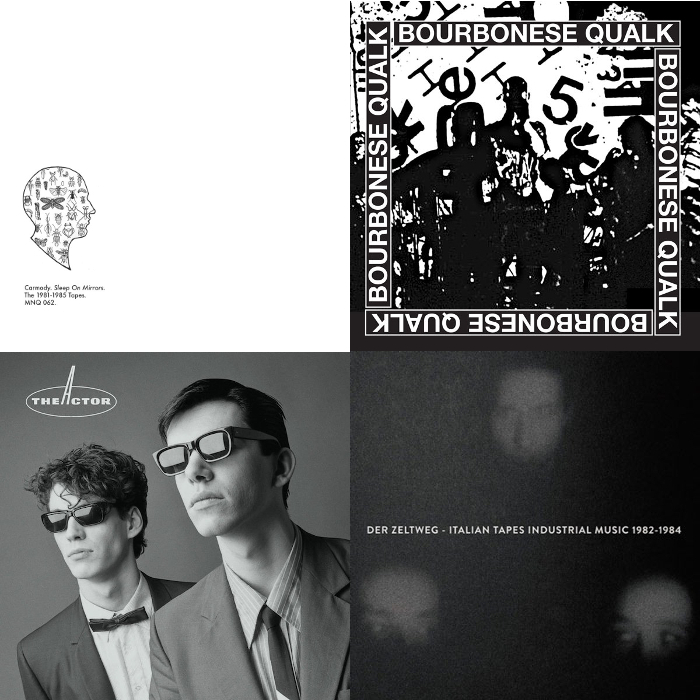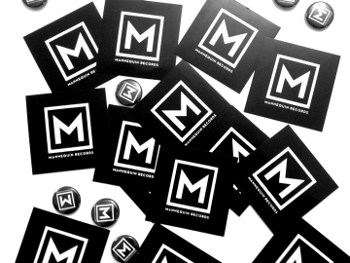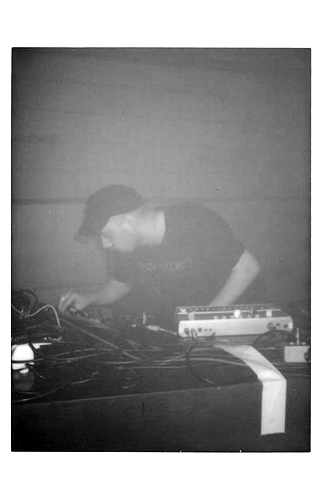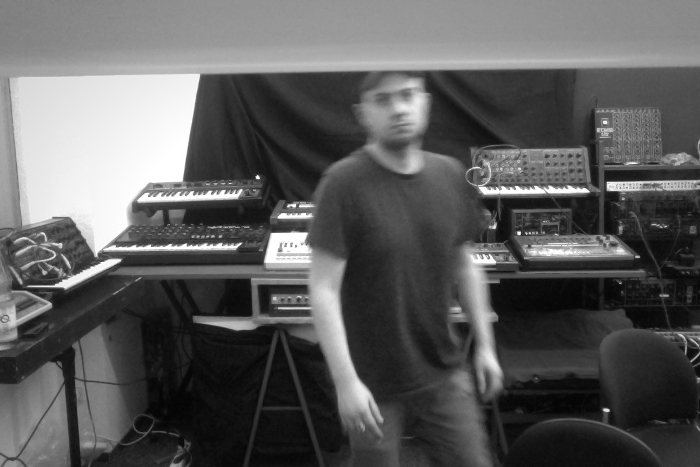Mannequin Records – The Line of Darkness

Alessandro Adriani opens up with Flora Pitrolo about his label Mannequin, his Rome upbringing, Italian Wave, the appetite for reissues and much more.
In the first five minutes of speaking with the proud father of Mannequin Records, Alessandro Adriani, our conversation covers at least twenty topics. He’s just back from Italy and in the midst of a hectic first morning in Berlin. UPS has dumped the Monuments and Police des Moeurs releases at a florist nearby, and in the studio he shares with Douglas Lee, the mixer has broken. I hear Lee come in and and say: “It’s dead. We need to find a solution.” Adriani’s also working on a book of Italian New Wave photographs with his long-term designer Giandomenico Carpentieri, as if there wasn’t enough work with the records. Carpentieri insisted on getting rid of the label’s old logo – the mannequin head – and on substituting it with a rigid, clean ‘M’ which still encapsulates its alien elegence.
So Adriani is busy. And Mannequin Records, which is approaching its eighth birthday, is at an interesting point in its life. Super productive (“I’m doing 23 records a year!” he exclaims, as if speaking from a speeding motorbike), the label’s been bending its focus back and forwards, swinging between two fundamental identities as a reissue label and as a hub for new artists and bands. Adriani himself is increasingly active as a DJ – a recent highlight was his set at Atonal earlier this year – and is clearly taken by the breadth of possibilities offered by Berlin, where he relocated to in 2012 after his Roman “isolation”.
Mannequin is also having an interesting time understanding where the label will go next. “When will people start getting fed up with all of these reissues?” Adriani ponders, adding, “we’ll never stop digging, but are people still as interested as they were four or five years ago?” He wonders if things are changing, whether “people are moving towards techno, industrial, towards harder stuff…”
 Thankfully, that seems like a wave Mannequin can ride. Recent releases attest to that, such as the ultra-hammering Beau Wanzer Adjustment of “Disconnect Myself” by //TENSE//. But what has especially emerged of late is Adriani’s capability to pull the darker, more violent facets of his musical heritage towards reinventing those sonorities for the present. Take the Ancient Methods mixes of south London industrialists Bourbonese Qualk or An-i’s reworkings of two of Musumeci’s tracks from the early 1980s, both released earlier this year. Indeed, the output of Turin’s dance-industrial nucleus Musumeci, whose work has been a constant presence in the label’s catalogue over the past couple of years, pieces together Mannequin’s identities rather neatly. The first unearthed track of theirs, “Harry Batasuna” was one of the really unknown gems on the second volume of Danza Meccanica. Even amongst long-time lovers of Italian obscurities, a common reaction was a wide-eyed “and what is this?”
Thankfully, that seems like a wave Mannequin can ride. Recent releases attest to that, such as the ultra-hammering Beau Wanzer Adjustment of “Disconnect Myself” by //TENSE//. But what has especially emerged of late is Adriani’s capability to pull the darker, more violent facets of his musical heritage towards reinventing those sonorities for the present. Take the Ancient Methods mixes of south London industrialists Bourbonese Qualk or An-i’s reworkings of two of Musumeci’s tracks from the early 1980s, both released earlier this year. Indeed, the output of Turin’s dance-industrial nucleus Musumeci, whose work has been a constant presence in the label’s catalogue over the past couple of years, pieces together Mannequin’s identities rather neatly. The first unearthed track of theirs, “Harry Batasuna” was one of the really unknown gems on the second volume of Danza Meccanica. Even amongst long-time lovers of Italian obscurities, a common reaction was a wide-eyed “and what is this?”
Adriani explains that the Musumeci tape came from a trip with label co-founder Carlo Cassaro to Disfunzioni Musicali, one of Rome’s most influential underground record stores, on the sombre day it gave up the ghost in 2007. Adriani and Cassaro, who continue to co-run Mannequin alongside the latter’s In The Night Time label, went through boxes of stuff that hadn’t been opened for years. “They used to run a couple of labels from the store, so people used to send them demos – and they were full of Italian tapes they were getting rid of. We bought them for 50 cents a piece”.
Those tapes provided alot of the music on the two Danza Meccanica compilations, and the “batch” contained a number of unknown treasures. “The Musumeci tape was totally new to me, and it was a bomb. I loved it, I looked for the band everywhere to no avail. In the end I released that track without asking permission,” he hastens to add this is not something he has done before or since. Yet he’s glad he did this once, “because in the end it was them who got in touch with me to thank me and to let me hear more. Before then I was left with this tape which was numbered Der Zeltweg 007. I thought hang on: one, two… what are on the other six?”
Doing reissues is an archeological affair, but the work is also sociological and psychological. The internet has made it much easier to contact people, but beyond this lies a longer, and sometimes more complex situation. Adriani’s work as archivist, which began much earlier than Mannequin as he dug up records and posted them on his 7’’ from the underground blog, is thrilling but also exhausting. “It’s hard because these are human relationships as well as professional ones. Sometimes we’ve become great friends with the artists we’ve found. Musumeci are an example of this, as are Sandro Marchetti from L.A.S.’s Crime, or Giacomo Spazio, who was in 2+2=5.”
But in other cases, “artists can be hard to reach, hard to deal with, and sometimes they don’t want their music to resurface,” he adds. “It’s happened that I’ve contacted people and they don’t want to know about being reissued.” Adriani, however, understands why: “the music we reissue is dark, and it often corresponds to dark times in people’s lives, that they’d rather not revisit.”
The relationship with new bands isn’t easy either – Adriani laments a lack of time, of trust, the inclination of new artists putting out too much, or not wanting to give up any artistic control. “It’s a relationship that takes trust, and new artists are nervous,” he says, and continues, admitting amusingly, “I’m unbearable too, I have to say. I’m quite direct in how I say things and I piss people off.”

As a discographer, Adriani’s headmaster attitude might make relationships hard, but in some cases it’s paid off. He’s proud, for example, of Tropic of Cancer’s current success following 2012’s Permission Of Love, as he is of Italian outfit Soviet Soviet, whose first official release was on Mannequin with Frank (Just Frank). “People don’t send me demos much anymore, maybe they’ve understood that there’s no point, it’s a waste of time.” He explains the bands he has found have been the recommendation of friends, “or acts that I’ve found looking for things on the internet, even on MySpace, or people I was working with and whose work I loved anyway.”
Mushy, aka Valentina Fanigliulo, is one of those people – in fact Mannequin’s first release back in 2008 was the imaginary soundtrack the two did together for Jodorowsky’s 1968 film Fando y Lis, made to sell at the gig. Other early releases came from Adriani’s own quasi-solo project Newclear Waves, and it wasn’t until Danza Meccanica was released that anyone thought it was going to turn into a fully-fledged label. Adriani insists Danza Meccanica was where it was supposed to end; Mannequin was functioning perfectly well as a mail order service, priding itself for stocking old and new stuff that was hard to find in Europe, let alone in Italy. All Cassaro and Adriani wanted to do was put out some of the Italian underground they’d been collecting over the years – but starting a label as such was never amongst their intentions.
Adriani has a background in marketing, a degree in psychology, a passion for dark electronic music, and, a knack for collecting and selling. Rather amusingly, I learn the capital to start his mail order service came from an odd business of buying and selling Magic: The Gathering cards people used to collect in the ‘90s. “I went down in the basement one day and thought why don’t I search for this stuff on the internet, and it was worth a load of money. We accumulated enough to do the stuff we wanted to do… in a sense, indirectly, we can say that Mannequin Records exists thanks to me selling magic cards on the web,” Adriani says with a laugh.
The hunter, gatherer, and collector are clearly personality traits on which Mannequin was built. As we talk on the phone a mental picture forms of a curious, hyperactive Adriani – it’s clear that he has been ‘active’ ever since he could be, that he’s the searching, organising, agitating type. He feverishly lines up gigs he’s attended, scenes he’s frequented, through people he’s spoken to, discovered, playing records that have made his heart beat. Our conversation is peppered by a series of questions from Adriani like, “do you remember that? Do you remember him?”, regardless of whether the subject happened in the recent past or during a time when he and I were still unable to read or write.
 In truth, I do remember a lot of what he talks about. I grew up amidst a tiny goth/synth/coldwave scene in Palermo, Sicily, and my friends and I occasionally travelled to Rome to see gigs, buy records and to talk and dance with like-minded people. Defunct record stores, labels, and, sadly, also people come up as he recounts his personal attachment to the kind of music he puts out. It’s clear that somehow the joy for Adriani also lies in the fact that it’s all connected, in understanding himself as part of a sometimes unlikely underground history which reaches into the 1970s and stretches into the future: more of a question of prosperity than nostalgia.
In truth, I do remember a lot of what he talks about. I grew up amidst a tiny goth/synth/coldwave scene in Palermo, Sicily, and my friends and I occasionally travelled to Rome to see gigs, buy records and to talk and dance with like-minded people. Defunct record stores, labels, and, sadly, also people come up as he recounts his personal attachment to the kind of music he puts out. It’s clear that somehow the joy for Adriani also lies in the fact that it’s all connected, in understanding himself as part of a sometimes unlikely underground history which reaches into the 1970s and stretches into the future: more of a question of prosperity than nostalgia.
As a Roman, Rome plays a big part in how he thinks about this story, but he describes the place as “essentially a techno city,” dipping into his teenage memories. “I was a bit too young to really frequent the scene, but I used to hear all this Roman techno on the radio, people like Lory D, Leo Anibaldi, I used to tape it off the radio and I knew it well. But there was this rave scene, which was really politicised too, which mattered socially not only musically. It’s as if techno was actually culturally important in Rome, and maybe it still is…”
Adriani discloses that a reissue of the angular post-punk band Move is to be expected on Mannequin soon – his first Roman reissue, which perhaps confirms Adriani’s theories regarding the city’s sound. But the remainder of 2015 will also bring another hot fragment of the Roman scene from yet another side, the legendary Mons Testaceum by Heinrich Dressel – aka Minimal Rome’s Valerio Lombardozzi – originally released back in 2007.
But what’s special about Italian wave beyond the fact that it’s ingrained in his background; how does he hear it? “Right, let me answer this one properly.” Adriani pauses, “the thing is that this music isn’t ours – it’s German, British, Belgian, French. Coldwave is essentially a French genre. But then in Italy this music acquired something else.” He attributes this part to the Italian sense of melody and romance, “Italian wave is extremely romantic. But it’s also a kind of dark. In Italy this romantic music was being made while there were bombs going off in the squares.”
Adriani and I comment on the Italian situation for a while. The ‘70s and early ‘80s were a time of great political unrest in Italy, the so-called “years of lead”. Readers will be spared the complex scenario that led to the “lead”, but very serious protests from workers and students, as well as terrorist and armed subversion groups, proliferated on both the extreme Right and Left, leaving a lot of devastation behind. A massive heroin boom from the late 1970s onwards gave way to yet another kind of darkness – and this collective darknesses produced a lot of the music Adriani loves and releases.
Turin, Italy’s industrial capital, is clearly where it’s at for Mannequin at the moment, and Adriani informs me that we can start licking our lips now for a second volume of Italian Tapes Industrial Music sometime in 2016. He obligingly sends me a couple of images and files to listen to, urging me to stay tight-lipped about them (let me just say, there’s a lot to look forward to).
Adriani muses further about the city. “Turin really was like a kind of Sheffield,” he says, to make a comparison. “Italy has a lot of noise music, and a load of experimental industrial music, but those Der Zeltweg tapes have opened up a whole world,” he adds enthusiastically. “Because it’s not only industrial – it’s so danceable, it’s brutal dance music. It’s a bomb.”
 Lots of things are “a bomb” for Adriani. It’s his noun of choice to describe a great track – it’s also a very Roman verbal tick, and quite apt. Something that explodes, something violent, something loud, but also something tragic, something black. Bombs going off in the squares, bombs going off on the dancefloor; some kind of moral to be drawn about how electronic music speaks about a time. Philosophical considerations aside, this love for the bomb is reflected in his work as a DJ as much as it is in the way he runs his label – you generally trust him to provide a hard, dark dance track, whether it’s a reissue or a new act, whether it’s Italo or industrial or new wave.
Lots of things are “a bomb” for Adriani. It’s his noun of choice to describe a great track – it’s also a very Roman verbal tick, and quite apt. Something that explodes, something violent, something loud, but also something tragic, something black. Bombs going off in the squares, bombs going off on the dancefloor; some kind of moral to be drawn about how electronic music speaks about a time. Philosophical considerations aside, this love for the bomb is reflected in his work as a DJ as much as it is in the way he runs his label – you generally trust him to provide a hard, dark dance track, whether it’s a reissue or a new act, whether it’s Italo or industrial or new wave.
Although he is keen to declare himself open to anything in how he makes decisions for the label, a certain Mannequin sound is something that does exist, and I’m eager to know what it is to him. “I never made an aesthetic choice on what the label was going to focus on, but looking back at the 70-plus releases…” Adriani halts and rolls off a number of records, thinking out loud about the label’s back-catalogue. “If I were to single out one thing that keeps the entire label together,” he continues, “ I would say it’s the line of darkness. It’s all dark music, and it’s the line of darkness that interests me, I suppose that’s what defines what I love to hear.”
Perhaps even more as a DJ than as label boss, Adriani hears a lot. In love with the days in which tapes would return to the studio for post-disco retouches, Adriani especially likes playing stuff from his own or fellow labels which still hasn’t come out, getting that glimpse into a track’s future. There’s also an ethical dimension to such a practice, he feels. “Instead of nicking each others’ artists and trying to sell more than each other, we should be playing each other’s stuff more, supporting it. Berlin makes it all so much easier, because so many people relocate here, and so many people come and go.” He cites Unknown Precept founder Jules Peter as an example of what he’s referring to. “Jules lives around the corner. I’m doing a Maoupa Mazzocchetti record on Mannequin, but because he was formerly on Unknown Precept, we talked it over together first.” Adriani feels a sense of community or a scene can be fostered, “as long as artists and labels respect each others’ work.”
When I ask Adriani to sketch out his own community, Unknown Precept returns, as does Oscar Powell’s Diagonal label: “he’s someone that really dares, he really doesn’t care. We need people like Oscar, who can reinterpret the message.” Similar compliments are passed on to L.I.E.S., Beau Wanzer (“basically a genius”) and to Doug Lee, who doesn’t seem to have lost his mystique despite being quite present in Adriani’s everyday life. “Those An-i records on Cititrax… he calls it techno, but I always tell him I don’t think it’s techno.” Adriani admits An-i may use the instruments of techno such as the 909, the 303, the SH-101, “but they’re totally reinterpreted, and there’s industrial in there, there’s new beat in there, it’s much richer. It’s really at another level.”

Are we to expect more collaborations between the two? Adriani’s lips are sealed. Instead, he tries to tease by revealing that Beau Wanzer has recorded a number of things with him which remain unreleased and silently hidden in his hard-drive. In terms of reissues, apart from the aforementioned second volume of Der Zeltweg, and the Move LP, we can expect work from Italian outfits Plath and the really quite extraordinary Flo & Andrew, as well as a 12” re-edition of Effetto Joule’s Italo hit Robespierre. In terms of new artists, Adriani is currently releasing the Police Des Moeurs double LP Ceux Qui Restent, and seems particularly excited about Mazzocchetti, Heinrich Dressel and Sean Pierce’s début Sutro EP.
Things seem to be dark, austere and serious for the year ahead. As our conversation draws to a close, a question I ask is: Why the name Mannequin? Is it because of Kraftwerk’s Showroom Dummies? Is it because of Italian painter Giorgio De Chirico’s mannequins, that were so influential on the graphics of Italian new wave? I am told a much more personal and less referential story, that seems to perfectly symbolise the label and the music it puts out. When Adriani was younger, his mother worked in a perfumery that used mannequin heads to display jewellery. He rescued one that had been thrown away to use as a headphone stand. And what was so special about it? “It was beautiful”, he reassures me, “it was a great mannequin. Made of black velvet, and almost completely expressionless.” The mannequin has disappeared from the logo, but its alien elegance stays firmly in place.
Interview by Flora Pitrolo
Mannequin on Juno